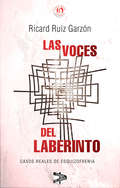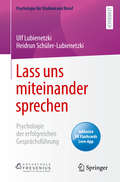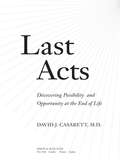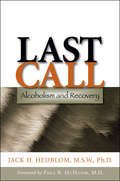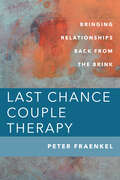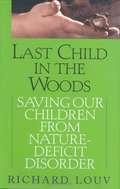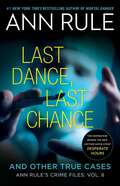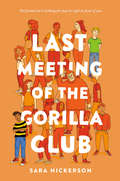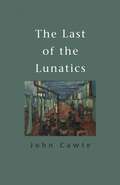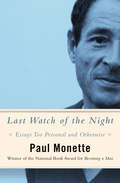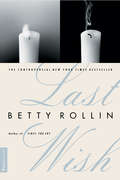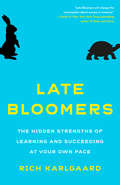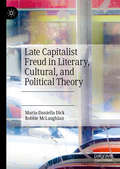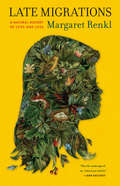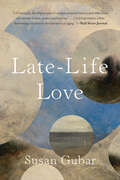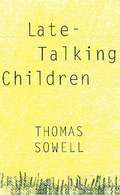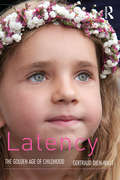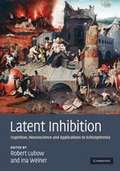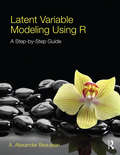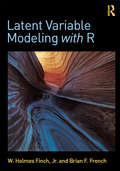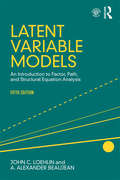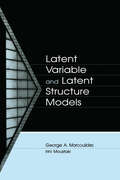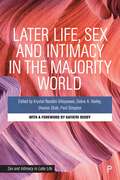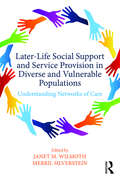- Table View
- List View
Las voces del laberinto
by Ricard Ruiz GarzónEste libro da voz a quienes habitualmente no la tienen. A aquellos que, extraviados en el laberinto de la enfermedad mental, sufren el rechazo de una sociedad presuntamente cuerda. Basados en quince testimonios reales sobre el padecimiento de la esquizofrenia, los relatos recogidos en Las voces del laberinto transmiten el dolor, el desconcierto, la impotencia y también la esperanza de quienes buscan una salida a la encrucijada que ofusca su existencia. Más que un tratado de psiquiatría, un ensayo sociológico o un manual de autoayuda, Las voces del laberinto es una aproximación testimonial, una recreación de casos reales que privilegia el punto de vista de los enfermos para romper tópicos, ahuyentar prejuicios y contribuir a la destrucción del estigma que el mal llamado esquizofrénico padece aún en nuestra sociedad.
Lass uns miteinander sprechen: Psychologie der erfolgreichen Gesprächsführung (Psychologie für Studium und Beruf)
by Heidrun Schüler-Lubienetzki Ulf LubienetzkiDurch dieses kompakte Lehrbuch lernen Sie auf unterhaltsame Weise die wichtigste Form menschlicher Kommunikation – das persönliche Gespräch – in seinen wesentlichen Facetten kennen. Es fokussiert sich vorrangig auf die Kommunikation im beruflichen Kontext, doch können die Prinzipien natürlich auch auf andere Lebensbereiche angewendet werden: Lernen Sie, wie wir neben dem gesprochenen Wort auch mit unserem Körper kommunizieren, wie wir Kontakt zu unseren Gesprächspartnern aufbauen und wie wir erreichen, dass andere Menschen Lust und Interesse haben, mit uns zu sprechen.
Last Acts
by David J. CasarettLast Actsdraws on the author's experiences to help terminally ill patients and families make careful decisions about end-of-life care.
Last Call: Alcoholism and Recovery
by Jack H. Hedblom"I knew about drunk, but did not know anything about living sober. I hadn’t really been sober for fifteen years. It wasn’t enough that I stopped drinking. I had to learn how to live."The journey from alcoholic insanity to sobriety—and the pivotal role of Alcoholics Anonymous (AA) in navigating that transition—is the focus of Last Call. Using powerful first-person narratives like the one above (composites of many anonymous speakers), psychotherapist Jack H. Hedblom provides compelling insights into the minds and hearts of addicted drinkers, from bizarre behavior and denial to the moment of "hitting bottom" and seeking change. Hedblom covers the process of getting sober, from diagnosis to detox to sobriety. He focuses on the challenge of learning to live without drinking—a long-term goal, Hedblom asserts, that is best achieved by regular participation in AA.Hedblom’s vivid descriptions reveal AA meetings as gatherings of fellowship, compassion, tears, and laughter. In relating the history of the organization, he describes the role of sponsors, elaborates on the Twelve Steps and the Promises, emphasizes the importance of spiritual development in recovery, and refutes the common misconceptions that equate spirituality with organized religion. Through the stories of people who have escaped the tyranny of alcoholism with the help of AA, Hedblom shows that the road to recovery is a journey of self-discovery, change, and hope.
Last Chance Couple Therapy: Bringing Relationships Back from the Brink
by Peter FraenkelStrategies and skills for therapists working with couples about to dissolve. Therapy with couples on the brink of relationship dissolution involves unique challenges. Partners present with high levels of conflict, low levels of intimate connection, disdain and discouragement, and limited patience or hope. These couples have often tried therapy without lasting success, and announce that “this is our last chance.” Partners want to see evidence in the first session that the therapist can offer something new and that change is possible. Peter Fraenkel presents a practical, creative, integrative approach that combines action- and insight-oriented techniques to help last-chance couples manage conflict, modulate intense negative emotions, address power struggles, develop mutual compassion, and restore emotional intimacy and pleasurable connection. Special attention is paid to developing a collaborative therapeutic alliance when partners have little motivation for therapy or faith that it can be effective. Through engaging in “nonbinding experiments in possibility,” partners can then better evaluate whether to “stay or go.”
Last Child in the Woods: Saving Our Children from Nature-Deficit Disorder
by Richard LouvFrom the Book Jacket: "I like to play indoors better 'cause that's where all the electrical outlets are," reports a fourth-grader. Never before in history have children been so plugged-in-and so out of touch with the natural world. In this groundbreaking new work, child advocacy expert Richard Louv direcdy links the lack of nature in the lives of today's wired generation-he calls it nature deficit-to some of the most disturbing childhood trends, such as rises in obesity, Attention Deficit Disorder (ADD), and depression. Some startling facts: By the 1990s the radius around the home where children were allowed to roam on their own had shrunk to a ninth of what it had been in 1970. Today, average eight-year- olds are better able to identify cartoon characters than native species, such as beetles and oak trees, in their own community. The rate at which doctors prescribe antidepressants to children has doubled in the last five years, and recent studies show that too much computer use spells trouble for the developing mind. Nature-deficit disorder is not a medical condition; it is a description of the human costs of alienation from nature. This alienation damages children and shapes adults, families, and communities. There are solutions, though, and they're right in our own backyards. Last Child in the Woods is the first book to bring together cutting-edge research showing that direct exposure to nature is essential for healthy childhood development-physical, emotional, and spiritual. What's more, nature is a potent therapy for depression, obesity, and ADD. Environment-based education dramatically improves standardized test scores and grade point averages and develops skills in problem solving, critical thinking, and decision making. Even creativity is stimulated by childhood experiences in nature. Yet sending kids outside to play is increasingly difficult. Computers, television, and video games compete for their time, of course, but it's also our fears of traffic, strangers, even virus- carrying mosquitoes-fears the media exploit- that keep children indoors. Meanwhile, schools assign more and more homework, and there is less and less access to natural areas. Parents have the power to ensure that their daughter or son will not be the "last child in the woods," and this book is the first step toward that nature-child reunion.
Last Dance, Last Chance: And Other True Cases (Ann Rule's Crime Files #8)
by Ann Rule&“America&’s best true-crime writer&” (Kirkus Reviews) presents an all-new collection of crime stories drawn from her private files and featuring the riveting case of a fraudulent doctor whose lifelong deceptions had deadly consequences. The inspiration behind the upcoming Lifetime movie event Desperate Hours.Dr. Anthony Pignataro was a cosmetic surgeon and a famed medical researcher whose flashy red Lamborghini and flamboyant lifestyle in western New York State suggested a highly successful career. But appearances can be deceiving—and, for the doctor&’s wife, very nearly deadly. Now, the motivations of the classic sociopath are plumbed with chilling accuracy by Ann Rule. Along with other shocking true cases, this worldwide headline-making case will have you turning pages in disbelief that a trusted medical professional could sink to the depths of greed, manipulation, and self-aggrandizement where even slow, deliberate murder is not seen for what it truly is: pure evil.
Last Meeting of the Gorilla Club
by Sara NickersonA moving new middle grade novel about childhood anxiety and grief, from the author of The Secrets of Blueberries, Brothers, Moose, and Me. Eleven-year-old Josh Duncan has never had much luck making friends--not the real kind, anyway. Moving to a new town is supposed to be a chance to leave behind the problems that plagued Josh at his last school. Problems like Big Brother, Josh's favorite and best friend. Because, as Josh's parents tell him, he's too old to still have imaginary friends. But even before the first day of school is over, Big Brother reappears--and he's not alone. Only this time one of Josh's imaginary friends seems to be interacting with another boy at school, Lucas Hernandez. Can Lucas see them, too? Brought together by an unusual classroom experiment and a mysterious invitation to join something called the Gorilla Club, Josh and Lucas are about to discover how a unique way of seeing the world can reveal a real-life friend.
Last Of The Lunatics
by John CawteJohn Cawte looks back in amazement to his years as a young doctor in an Australian madhouse. He now recognises the people he treated in the early 1950s as 'the last of the lunatics'. Anti-psychotic and anti-depressant drugs were unknown. Bursting asylums, housing an uproar of insanity, were wastelands of stigma and dread. 'Management' techniques ranged from straitjackets and padded cells to isolation and primitive shock treatments. Miraculously, Cawte's case notes were saved from destruction. Rereading them after forty years, he was gripped by the horror they revealed and the questions they raised. Much has changed for the better. Many of the fearful illnesses he recorded have disappeared, treatments are vastly more effective and stigma has lessened. But his notes hold a surprising and challenging lesson—that temporary 'asylum' from the stresses of life is often all that a disturbed person needs for recovery. The Last of the Lunatics is rich and moving. The personal stories recorded by a perceptive young man have been filtered by experience and sharpened by telling literary references. Doctors, psychiatrists, those who remember and those who wonder about the human condition will be touched by this compassionate book.
Last Watch of the Night: Essays Too Personal and Otherwise
by Paul MonetteTender and passionate autobiographical essays by the National Book Award–winning author of Becoming a Man. &“Does it go too fast?&” Monette asks about life at the beginning of one piece. The answer is a resounding &“yes&” for the individuals who populate this stunning work of nonfiction. These ten autobiographical essays memorialize those whose lives have been claimed by AIDS. Following Becoming a Man and Borrowed Time, Last Watch of the Night is Monette&’s third and final self-portrait. In this collection, he confronts death—those of lovers and friends, and even his own eventual demise—with both bravery and compassion.This ebook features an illustrated biography of Paul Monette including rare images and never-before-seen documents from the Paul Monette papers of the UCLA Library Special Collections.
Last Wish
by Betty RollinThe groundbreaking New York Times bestseller?an intimate, fiercely honest memoir of a daughter's struggle to come to terms with her terminally ill mother's decision to die?now in trade paperback with a new reader's guide inside
Lastingness: The Art of Old Age
by Nicholas DelbancoAmerica grows older yet stays focused on its young. Whatever hill we try to climb, we're "over" it by fifty and should that hill involve entertainment or athletics we're finished long before. But if younger is better, it doesn't appear that youngest is best: we want our teachers, doctors, generals, and presidents to have reached a certain age. In context after context and contest after contest, we're more than a little conflicted about elders of the tribe; when is it right to honor them, and when to say "step aside"? In LASTINGNESS, Nicholas Delbanco, one of America's most celebrated men of letters, profiles great geniuses in the fields of visual art, literature, and music-Monet, Verdi, O'Keeffe, Yeats, among others - searching for the answers to why some artists' work diminishes with age, while others' reaches its peak. Both an intellectual inquiry into the essence of aging and creativity and a personal journey of discovery, this is a brilliant exploration of what determines what one needs to do to keep the habits of creation and achievement alive.
Late Bloomers: The Power of Patience in a World Obsessed with Early Achievement
by Rich KarlgaardA groundbreaking exploration of what it means to be a late bloomer in a culture obsessed with SAT scores and early success, and how finding one's way later in life can be an advantage to long-term achievement and happiness.We live in a society where kids and parents are obsessed with early achievement, from getting perfect scores on SATs to getting into Ivy League colleges to landing an amazing job at Google or Facebook - or even better, creating a startup with the potential to be the next Google or Facebook or Uber. We see software coders becoming millionaires or billionaires before age 30 and feel we are failing if we are not one of them.Late bloomers, on the other hand, are undervalued - in popular culture, by educators and employers, and even unwittingly by parents. Yet the fact is a lot of us - most of us - do not explode out of the gates in life. We have to find our way. We have to discover our passions, and talents and gifts. That was true for author Rich Karlgaard, who had a mediocre academic career at Stanford (which he got into by a fluke), and after graduating, worked as a dishwasher and night watchman before finally finding the inner motivation and drive that ultimately led him to start up a high-tech magazine in Silicon Valley, and eventually to become the publisher of Forbes magazine.There is a scientific explanation for why so many of us bloom later in life. The executive function of our brains doesn't mature until age 25 - and later for some. In fact our brain's capabilities peak at different ages. We actually enjoy multiple periods of blooming in our lives. Based on several years of research, personal experience, and interviews with neuroscientists and psychologists, and countless people at different stages of their careers, Late Bloomers reveals how and when we achieve our full potential - and why today's focus on early success is so misguided, and even harmful.
Late Capitalist Freud in Literary, Cultural, and Political Theory
by Robbie McLaughlan Maria-Daniella DickLate Capitalist Freud in Literary, Cultural, and Political Theory proposes that late Freudian theory has had an historical influence on the configuration of contemporary life and is central to the construction of twenty-first-century capitalism. This book investigates how we continue to live in the Freudian century, turning its attentions to specific crisis points within neoliberalism—the rise of figures like Trump, the development of social media as a new superego force, the economics that underpin the wellness and self-care industries as well as the contemporary consumption of popular culture—to maintain the continued historical importance of Freudian thought in all its dimensions. Drawing on psychoanalytic theory, literary theory, cultural studies, and political theory, this book assesses the contribution that an historical and theoretical consideration of the late Freud can make to analyzing certain aspects of late capital.
Late Migrations: A Natural History of Love and Loss
by Margaret RenklFrom the New York Times columnist, a portrait of a family and the cycles of joy and grief that mark the natural world: “Has the makings of an American classic.” —Ann Patchett Growing up in Alabama, Margaret Renkl was a devoted reader, an explorer of riverbeds and red-dirt roads, and a fiercely loved daughter. Here, in brief essays, she traces a tender and honest portrait of her complicated parents—her exuberant, creative mother; her steady, supportive father—and of the bittersweet moments that accompany a child’s transition to caregiver.And here, braided into the overall narrative, Renkl offers observations on the world surrounding her suburban Nashville home. Ringing with rapture and heartache, these essays convey the dignity of bluebirds and rat snakes, monarch butterflies and native bees. As these two threads haunt and harmonize with each other, Renkl suggests that there is astonishment to be found in common things: in what seems ordinary, in what we all share. For in both worlds—the natural one and our own—“the shadow side of love is always loss, and grief is only love’s own twin.”Gorgeously illustrated by the author’s brother, Billy Renkl, Late Migrations is an assured and memorable debut.“Magnificent . . . Readers will savor each page and the many gems of wisdom they contain.” —Publishers Weekly (starred review)
Late-Life Love: A Memoir
by Susan Gubar“Winning [and] intelligent. . . . [An] impressive, often heartening addition to the literature of aging.” — Heller McAlpin, Wall Street Journal In this “unique blend of memoir and literary commentary” (Bookpage), acclaimed author and literary scholar Susan Gubar contemplates the beauty and strength of enduring love—both for her husband and for the literature that has shaped her life. Throughout the complications of devoted caregiving, her own ongoing cancer treatments, and a stressful move to a more manageable apartment, Gubar proves that love and desire have no expiration date—on the page or in life. Late-Life Love offers a resounding retort to ageist stereotypes, appraises the obstacles unique to senior couples, and celebrates second chances.
Late-Talking Children: Bright Children Who Talk Late
by Thomas SowellThe painful and baffling mystery as to why some obviously bright children do not begin talking until long after the ”normal” time is explored in this book through personal experiences and the findings of scientific research. The author’s own experiences as the father of such a child led to the formation of a goup of more than fifty sets of parents of similar children. The anguish and frustration of these prents as they try to cope with children who do not talk and institutions that do not understand them is a remarkable and moving human story. Fortunately, some of these children turn out to have not only normal intelligence but even outstanding abilities, especially in highly analytical fields such as mathematics and computers. These fascinating stories of late-talking children and the remarkable families from which they come are followed by explorations of scientific research that throw light on unusual development patterns.
Latency: The Golden Age of Childhood
by Gertraud Diem-WilleLatency: The Golden Age of Childhood concerns the child’s emotional and cognitive development during the period of latency. It constitutes a bridge between the first stormy years of child development and adolescence. The conflicts and libidinous wishes of early childhood are relegated to the background and become latent: in general, an emotional and physical stabilization occurs. The child is attempting to find its place in the world. Accordingly, its primary interest is no longer in itself or its parents, but in the outside world. This is particularly manifested in forms of play typical for this age range, strongly influenced by imitation of the adult world and reality-oriented. At the same time, the body is explored (and its awareness is strengthened through numerous games involving movement, skill and competition). In all societies, this period is when school begins. The latency development includes new physical and intellectual capabilities as well as the development of new ways to deal with problems of social hierarchy; gradually, tolerance of tensions and a stabilization of identity are developed as well.
Latent Inhibition: Cognition, Neuroscience and Applications to Schizophrenia
by R. E. Lubow Ina WeinerLatent inhibition is a phenomenon by which exposure to an irrelevant stimulus impedes the acquisition or expression of conditioned associations with that stimulus. Latent inhibition, an integral part of the learning process, is observed in many species. This comprehensive collection of studies of latent inhibition, from a variety of disciplines including behavioural/cognitive psychology, neuroscience and genetics, focuses on abnormal latent inhibition effects in schizophrenic patients and schizotypal normals. Amongst other things, the book addresses questions such as, is latent inhibition an acquisition or performance deficit? What is the relationship of latent inhibition to habituation, extinction, and learned irrelevance? Does reduced latent inhibition predict creativity? What are the neural substrates, pharmacology, and genetics of latent inhibition? What do latent inhibition research and theories tell us about schizophrenia? This book provides a single point of reference for neuroscience researchers, graduate students, and professionals, such as psychologists and psychiatrist
Latent Variable Modeling Using R: A Step-by-Step Guide
by A. Alexander BeaujeanThis step-by-step guide is written for R and latent variable model (LVM) novices. Utilizing a path model approach and focusing on the lavaan package, this book is designed to help readers quickly understand LVMs and their analysis in R. The author reviews the reasoning behind the syntax selected and provides examples that demonstrate how to analyze data for a variety of LVMs.? Featuring examples applicable to psychology, education, business, and other social and health sciences, minimal text is devoted to theoretical underpinnings. The material is presented without?the use of matrix algebra. As a whole the book prepares readers to write about and interpret LVM results they obtain in R. Each chapter features background information, boldfaced key? terms defined in the glossary, detailed interpretations of R output, descriptions of how to write the analysis of results for publication, a summary, R based practice exercises (with solutions included in the back of the book), and references and related readings. Margin notes help readers better understand LVMs and write their own R syntax. Examples using data from published work across a variety of disciplines demonstrate how to use R syntax for analyzing and interpreting results. R functions, syntax, and the corresponding results appear in gray boxes to help readers quickly locate this material. A unique index helps readers quickly locate R?functions, packages, and datasets. The book and accompanying website at http://blogs.baylor.edu/rlatentvariable/ provides all of the data for the book’s examples and exercises as well as R syntax so readers can replicate the analyses. The book reviews how to enter the data into R, specify the LVMs, and obtain and interpret the estimated parameter values. The book opens with the fundamentals of using R including how to download the program, use functions, and enter and manipulate data. Chapters 2 and 3 introduce and then extend path models to include latent variables. Chapter 4 shows readers how to analyze a latent variable model with data from more than one group, while Chapter 5 shows how to analyze a latent variable model with data from more than one time period. Chapter 6 demonstrates the analysis of dichotomous variables, while Chapter 7 demonstrates how to analyze LVMs with missing data. Chapter 8 focuses on sample size determination using Monte Carlo methods, which can be used with a wide range of statistical models and account for missing data. The final chapter examines hierarchical LVMs, demonstrating both higher-order and bi-factor approaches. The book concludes with three Appendices: a review of common measures of model fit including their formulae and interpretation; syntax for other R latent variable models packages; and solutions for each chapter’s exercises. Intended as a supplementary text for graduate and/or advanced undergraduate courses on latent variable modeling, factor analysis, structural equation modeling, item response theory, measurement, or multivariate statistics taught in psychology, education, human development, business, economics, and social and health sciences, this book also appeals to researchers in these fields. Prerequisites include familiarity with basic statistical concepts, but knowledge of R is not assumed.
Latent Variable Modeling with R
by W. Holmes Finch Brian F. FrenchThis book demonstrates how to conduct latent variable modeling (LVM) in R by highlighting the features of each model, their specialized uses, examples, sample code and output, and an interpretation of the results. Each chapter features a detailed example including the analysis of the data using R, the relevant theory, the assumptions underlying the model, and other statistical details to help readers better understand the models and interpret the results. Every R command necessary for conducting the analyses is described along with the resulting output which provides readers with a template to follow when they apply the methods to their own data. The basic information pertinent to each model, the newest developments in these areas, and the relevant R code to use them are reviewed. Each chapter also features an introduction, summary, and suggested readings. A glossary of the text’s boldfaced key terms and key R commands serve as helpful resources. The book is accompanied by a website with exercises, an answer key, and the in-text example data sets. Latent Variable Modeling with R: -Provides some examples that use messy data providing a more realistic situation readers will encounter with their own data. -Reviews a wide range of LVMs including factor analysis, structural equation modeling, item response theory, and mixture models and advanced topics such as fitting nonlinear structural equation models, nonparametric item response theory models, and mixture regression models. -Demonstrates how data simulation can help researchers better understand statistical methods and assist in selecting the necessary sample size prior to collecting data. -www.routledge.com/9780415832458 provides exercises that apply the models along with annotated R output answer keys and the data that corresponds to the in-text examples so readers can replicate the results and check their work. The book opens with basic instructions in how to use R to read data, download functions, and conduct basic analyses. From there, each chapter is dedicated to a different latent variable model including exploratory and confirmatory factor analysis (CFA), structural equation modeling (SEM), multiple groups CFA/SEM, least squares estimation, growth curve models, mixture models, item response theory (both dichotomous and polytomous items), differential item functioning (DIF), and correspondance analysis. ?The book concludes with a discussion of how data simulation can be used to better understand the workings of a statistical method and assist researchers in deciding on the necessary sample size prior to collecting data.? A mixture of independently developed R code along with available libraries for simulating latent models in R are provided so readers can use these simulations to analyze data using the methods introduced in the previous chapters. Intended for use in graduate or advanced undergraduate courses in latent variable modeling, factor analysis, structural equation modeling, item response theory, measurement, or multivariate statistics taught in psychology, education, human development, and social and health sciences, researchers in these fields also appreciate this book’s practical approach. The book provides sufficient conceptual background information to serve as a standalone text.? Familiarity with basic statistical concepts is assumed but basic knowledge of R is not.
Latent Variable Models: An Introduction to Factor, Path, and Structural Equation Analysis, Fifth Edition
by A. Alexander Beaujean John C. LoehlinLatent Variable Models: An Introduction to Factor, Path, and Structural Equation Analysis introduces latent variable models by utilizing path diagrams to explain the relationships in the models. This approach helps less mathematically-inclined readers to grasp the underlying relations among path analysis, factor analysis, and structural equation modeling, and to set up and carry out such analyses. This revised and expanded fifth edition again contains key chapters on path analysis, structural equation models, and exploratory factor analysis. In addition, it contains new material on composite reliability, models with categorical data, the minimum average partial procedure, bi-factor models, and communicating about latent variable models. The informal writing style and the numerous illustrative examples make the book accessible to readers of varying backgrounds. Notes at the end of each chapter expand the discussion and provide additional technical detail and references. Moreover, most chapters contain an extended example in which the authors work through one of the chapter’s examples in detail to aid readers in conducting similar analyses with their own data. The book and accompanying website provide all of the data for the book’s examples as well as syntax from latent variable programs so readers can replicate the analyses. The book can be used with any of a variety of computer programs, but special attention is paid to LISREL and R. An important resource for advanced students and researchers in numerous disciplines in the behavioral sciences, education, business, and health sciences, Latent Variable Models is a practical and readable reference for those seeking to understand or conduct an analysis using latent variables.
Latent Variable and Latent Structure Models (Quantitative Methodology Series)
by Irini Moustaki George A. MarcoulidesThis edited volume features cutting-edge topics from the leading researchers in the areas of latent variable modeling. Content highlights include coverage of approaches dealing with missing values, semi-parametric estimation, robust analysis, hierarchical data, factor scores, multi-group analysis, and model testing. New methodological topics are illustrated with real applications. The material presented brings together two traditions: psychometrics and structural equation modeling. Latent Variable and Latent Structure Models' thought-provoking chapters from the leading researchers in the area will help to stimulate ideas for further research for many years to come. This volume will be of interest to researchers and practitioners from a wide variety of disciplines, including biology, business, economics, education, medicine, psychology, sociology, and other social and behavioral sciences. A working knowledge of basic multivariate statistics and measurement theory is assumed.
Later Life, Sex and Intimacy in the Majority World (Sex and Intimacy in Later Life)
by Barry Lee Nafhesa Ali Sheren El Feki Selma Hajri Anushkaa Arora Sally Anne Param Travis Kong Madeline Burns Marcus Kissoon Cuauhtemoc SanchezLiterature on sex, intimacy and sexuality in later life has been heavily influenced by perspectives from more affluent regions, perpetuating the belief that the West is more sexually progressive and liberal than other cultures.This book challenges this belief by exploring diverse cultures and perspectives from the majority world, which are often overlooked. It highlights the importance of learning from cultures in the global South and East, dismantling stereotypes that frame them as sexually conservative or inferior. Variously drawing on structuralist, postcolonial and decolonial theory as well as social anthropology, the book critically examines binaries related to culture, age, sex and intimacy, highlighting the need to decentre Western perspectives as the benchmark while other cultures and practices are misunderstood.
Later-Life Social Support and Service Provision in Diverse and Vulnerable Populations: Understanding Networks of Care (Society and Aging Series)
by Janet M. Wilmoth Merril D. SilversteinLater-Life Social Support and Service Provision in Diverse and Vulnerable Populations offers current, multidisciplinary perspectives on social support and service provision to older Americans. The chapters trace how our understanding of social support among older adults has developed over the past 40 years and explore current gerontological research in the area. They consider how informal care arrangements articulate with formal long-term care policies and programs to provide support to the diverse population of older Americans. They also emphasize heterogeneity in the composition of support networks, particularly in relation to gender, sexual orientation, race/ethnicity, and immigrant status. Collectively, the chapters provide insight into the complexity of older adult’s social support networks that can be used to improve the services provided to caregivers and care recipients as well as the policies that promote high-quality support to people of all ages who are in need of assistance.
